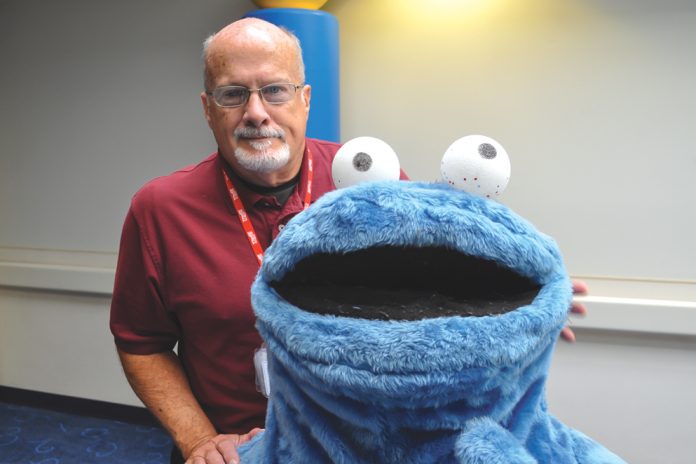
by Bobby Anderson, RN, Staff Writer
To say Mike Isaac’s resume is extensive would be an understatement.
EMT, police officer, detective, SWAT team member – all of it has combined into Isaac’s RN Nurse Manager role at JD McCarty Center for Children with Developmental Disabilities in Norman.
And for the past six years now, Isaac has been a nurse. But his past is almost as interesting as his present.
Fellow nurse manager Suanne Livingston likes working alongside Isaac and is constantly amazed by his background.
“He’s very organized and he’s very respected,” Livingston said. “He does a great job with staff. When he was a staff nurse he was a great staff nurse. I kind of defer to him as far as how he handles things employee-wise because he’s a little more hard-nosed than I am.”
“I learn a lot from him and I kind of watch and learn how he handles situations.”
Isaac worked in emergency rooms at night to help put him through college. He applied for PA school and quickly found it wasn’t a career track he wanted to pursue.
He spent some time in medical research and a couple other jobs before signing on with the Norman Police Department as an EMT for the ambulance service.
He attended the prerequisite police academy and later pursued his master’s degree. The only problem was working those 24-hour EMT shifts really took a toll on his studies.
So he decided to become a police officer instead.
“I said I would just transfer over and I did,” Isaac said. “I did really well and got promoted quickly and did a bunch of really good stuff but I got really interested in things involving mental health.”
A detective and eventually a supervisor, Isaac helped craft Norman’s policy on dealing with mental health subjects. His plans were carried over into department’s across the nation during his 27 years with Norman PD.
Isaac’s reputation earned him a spot helping craft officer-involved shooting policy.
“They weren’t getting the help they needed post-shooting,” Isaac said. “There were a lot of trauma victims involved with homicide and rape – two of the things I was assigned to – that weren’t getting follow-up care to prevent and treat post traumatic stress.”
Working with the FBI’s Behavioral Science unit in Quantico, Va., he helped craft policy to protect all involved.
“You didn’t take their gun right after a shooting. You took it as evidence but you replaced it,” Isaac said. “You didn’t put them on a desk job and treat them like they were unable to do work. Basically we wrote it so they would get a return to work slip.”
The process helped officers work through the ensuing mental and physical issues while protecting their personal health information. Inservice training was given and officers qualified again at the shooting range before easing back into their duties while riding with a supervisor.
“That was actually taken to Quantico for the national FBI academy that all law enforcement agencies around the world send people to.
“Our policy is still given out there.”
A friend mentioned he would be a perfect fit for nursing school.
“They sold me on this BADNAP program,” Isaac said of Oklahoma City Community College’s accelerated nursing program. “It was a great program. I wouldn’t do it again but it was a great way to get in and get employed and get out. I had a couple jobs before I even graduated.”
EMT, policeman, mental health advocate – you would think it all prepared him for nursing school.
“It did, but the pace was a great equalizer. It was just so fast. I don’t know how some of those people did it,” Isaac said. “I don’t know how some of those people did it, single heads of households with children to take to soccer games and other things.
“They were my heroes throughout. It was a great experience.”
Day and night, Isaac completed his ADN in eight months.
“It was tough but it was good. They don’t cut any corners,” Isaac said.
Assessment, investigation, report writing and observation – all skills Isaac honed in his former life have prepared him for a nursing career.
Nursing care plans are still vital. Different disciplines are heavily involved such as dietary and physical therapy.
He laughs when he admits his experience as Norman’s chief hostage negotiator still comes in handy.
But most days he doesn’t need it.
“The opportunity to see mostly the direct care staff grow in professionalism and responsibility so they can take ownership,” Isaac said of his greatest reward. “I always tell them when I interview it’s not a nursing home for kids.”

As a Saint Francis Hospital Muskogee nurse, you can enjoy the best of both worlds: a
friendly, small community and the resources of Oklahoma’s largest healthcare provider.
Less than an hour from Tulsa, Muskogee features outstanding cultural and natural
attractions, including numerous lakes and state parks that offer boating, skiing, golfing,
fishing and every other type of outdoor family recreational activity.
Be part of a rapidly growing, locally owned and operated, not-for-profit organization
dedicated to the health and wellness of eastern Oklahoma.
Why now is a great time to join our team:
• $10,000 sign-on bonus and relocation assistance for experienced RNs*
• Great benefits, including paid time off, tuition assistance, medical and dental insurance, retirement plans, onsite childcare, adoption benefits and more
• We are a qualified not-for-profit organization, so you may be eligible for federal student loan forgiveness**
To learn more about nursing opportunities at Saint Francis Hospital Muskogee, please call Melissa at 918-558-8028 or email [email protected].
*Applies to registered nurses in select patient units with at least two years of nursing experience. Two-year work commitment required.
**View program details at studentaid.ed.gov.
EOE Protected Veterans/Disability












